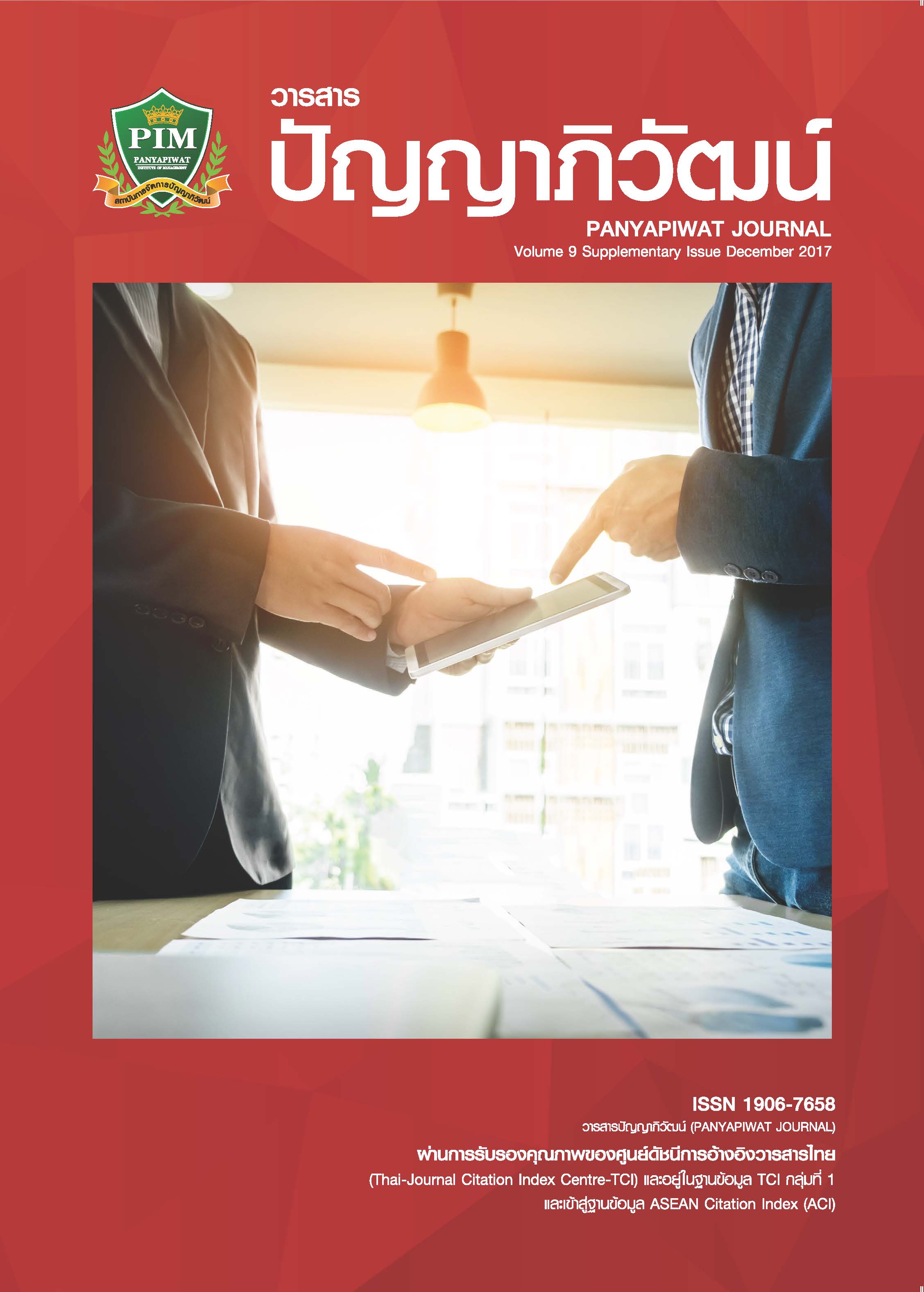ATTITUDES OF STATE-OWNED ENTERPRISES STAFFS TOWARDS GOVERNMENT FUNCTIONS IN THE REFORM OF STATE-OWNED ENTERPRISES IN CHINA
Main Article Content
บทคัดย่อ
The state-owned enterprises (SOEs) act as a special type of enterprises, playing a decisive role in the national economy of China. In the new historical era of deepening reform in SOEs, the government plays a vital role. It is necessary to understand how the SOEs staffs view the government functions in the process of SOEs reform and their attitudes are helpful for effective management of SOEs. This study took the Yunnan Construction and Investment Holding (YCIH) Group in Yunnan Province as a case study.
Both qualitative and quantitative research methodologies have been applied through the tools of survey questionnaires and in-depth interview. For the quantitative approach, 400 questionnaires were distributed to to the staffs of the YCIH Group to collect data, and percentage analysis was used to analyze the data. For a qualitative approach, interview to 8 senior executives was employed to gather the insightful information.
The findings from survey indicated that the most concerned element influencing the effectiveness of SOEs reform is government functions followed by organizational culture, incentives, leadership, innovation, external environment, individual attitude and human resources. The interview results showed that the key to the success of SOEs reform is that government fulfills its functions of macro-control, supervision and service.
รัฐวิสาหกิจ (SOEs) เป็นกิจการพิเศษซึ่งทรัพย์สินทั้งหมดเป็นของรัฐ ทำให้มีบทบาทสำคัญต่อสถานภาพทางเศรษฐกิจของประเทศจีน ในประวัติศาสตร์ยุคใหม่แห่งการปฏิรูปเชิงลึกของกระบวนการปฏิรูปรัฐวิสาหกิจ รัฐบาลมีบทบาทสำคัญในการบริหารจัดการ ดังนั้นการทำความเข้าใจมุมมองและทัศนคติของพนักงานรัฐวิสาหกิจที่มีต่อกระบวนการปฏิรูปรัฐวิสาหกิจ จะเป็นประโยชน์ในการบริหารรัฐวิสาหกิจให้มีประสิทธิภาพ ในครั้งนี้ ยูนนาน คอนสตรัคชั่น แอนด์ อินเวสท์เมนท์ โฮลดิ้ง (YCIH) กรุ๊ป ในมณฑลยูนนานได้ถูกเลือกเป็นกรณีศึกษา
วิธีวิจัยที่ใช้เป็นแบบผสมที่ประกอบไปด้วยวิธีวิจัยเชิงปริมาณและเชิงคุณภาพ ระหว่างการใช้แบบสอบถามและการสัมภาษณ์เชิงลึก ในการวิจัยเชิงปริมาณ ได้เก็บข้อมูลจากแบบสอบถามจำนวน 400 ฉบับจากพนักงานบริษัทยูนนาน คอนสตรัคชั่น แอนด์ อินเวสท์เมนท์ โฮลดิ้ง (YCIH) กรุ๊ป และวิเคราะห์ข้อมูลโดยใช้ค่าร้อยละ ในส่วนของการวิจัยเชิงคุณภาพ ได้ใช้การสัมภาษณ์กับผู้บริหารระดับสูงจำนวน 8 ท่าน เพื่อรวบรวมข้อมูลที่ลึกซึ้ง
ผลจากการสำรวจพบว่า องค์ประกอบที่มีอิทธิพลต่อประสิทธิภาพของการปฏิรูปรัฐวิสาหกิจมากที่สุดเป็นบทบาทของรัฐบาลตามด้วยความเป็นผู้นำ วัฒนธรรมองค์กร นวัตกรรม ทรัพยากรบุคคล ทัศนคติส่วนบุคคล แรงจูงใจ และสภาพแวดล้อมภายนอก ผลจากการสัมภาษณ์พบว่ากุญแจสู่ความสำเร็จในการปฏิรูปรัฐวิสาหกิจคือ บทบาทของรัฐบาลในการดูแล ควบคุม และบริการในระดับมหภาพ
Article Details
“ข้าพเจ้าและผู้เขียนร่วม (ถ้ามี) ขอรับรองว่า บทความที่เสนอมานี้ยังไม่เคยได้รับการตีพิมพ์และไม่ได้อยู่ระหว่างกระบวนการพิจารณาลงตีพิมพ์ในวารสารหรือแหล่งเผยแพร่อื่นใด ข้าพเจ้าและผู้เขียนร่วมยอมรับหลักเกณฑ์การพิจารณาต้นฉบับ ทั้งยินยอมให้กองบรรณาธิการมีสิทธิ์พิจารณาและตรวจแก้ต้นฉบับได้ตามที่เห็นสมควร พร้อมนี้ขอมอบลิขสิทธิ์บทความที่ได้รับการตีพิมพ์ให้แก่สถาบันการจัดการปัญญาภิวัฒน์หากมีการฟ้องร้องเรื่องการละเมิดลิขสิทธิ์เกี่ยวกับภาพ กราฟ ข้อความส่วนใดส่วนหนึ่งและ/หรือข้อคิดเห็นที่ปรากฏในบทความข้าพเจ้าและผู้เขียนร่วมยินยอมรับผิดชอบแต่เพียงฝ่ายเดียว”
เอกสารอ้างอิง
Allen, F., Jackowicz, K. & Kowalewski, O. (2013). The Effects of Foreign and Government Ownership on Bank Lending Behavior during a Crisis in Central and Eastern Europe. Ssrn Electronic Journal, 61(1), 13-25.
Bryman, A. (1984). The debate about quantitative and qualitative research: a question of method or epistemology. The British Journal of Sociology, 35(1), 75-92.
Buchanan, J. M. (1986). Liberty, Market and State. Brighton: Harvester.
Ju, J. W. (2010). The Role and Behavior of Township Government in the Process of Transition.China Social Science Press. [in Chinese]
Leila, F. & Huchet, J. (2006). What’s Next for China’s SOEs. Far Eastern Economic Review, 169(5), 32.
Lewis, P. (2003). New China–old ways? A case study of the prospects for implementing human resource management practices in a Chinese state-owned enterprise. Employee Relations, 25(1), 42-60.
Li, S. & Liang, Y. (2016). Competition Model and the Change of Local Governments’ Behavior and Governance of China’s Local Government Debt. Chinese Economy, 49(3), 199-212. [in Chinese]
Liu, J. J. (2003). Summary of Foreign State - owned Enterprise Reform Experience and Its Enlightenment to China’s State - owned Enterprise Reform. Contemporary Finance and Economic, (8), 82-85. [in Chinese]
Liu, Y .X. & Xu, T.J. (2010). The Enlightenment of Keynesian Theory of Government Intervention in the Financial Crisis. Journal of Inner Mongolia University Philosophy and Social Sciences,42(2), 33-37. [in Chinese]
Peng, P. (2002). On the Role of Government. China Social Sciences Press. [in Chinese]
Rawls, J. (1988). A theory of justice. China Social Science Press.
Remenyi, D. & Williams, B. (1998). Doing research in business and management: an introduction to process and method. Thousand Oaks, CA: Sage.
Samuelson, P. A. (1976). Economics of forestry in an evolving society. Economic inquiry, 14(4), 466-492.
Samuelson, P. A. (1986). Theory of optimal taxation. Journal of Public Economics, 30(2), 137-143.
Saunders, M., Lewis, P. & Thornhill, A. (2009). Understanding research philosophies and approaches. Research methods for business students, 4, 106-135.
Sha, A. W. & Qiao, B. Y. (2006). A Review of International Experiences in Intergovernmental Fiscal Relations. People’s Publishing House. [in Chinese]
Shleifer, A. (1997). Government in transition. European Economic Review, 41(3), 385-410.
Walter, C. E. (2010). The Struggle Over Ownership: How the Reform of State Owned Enterprises Changed China. The Copenhagen Journal of Asian Studies, 28(1), 83-108.
Wang, X. B. & He, X. L. (2005). On the Behavior of Government in Key Stage of SOE Reform. Journal of Northwest University, 35(3), 124-128. [in Chinese]
Xu, W. F. & Tang, B. F. (2000). An Analysis of the Role of Local Government Behavior. Jiang Hai Academic Journal, (2), 42-46. [in Chinese]


